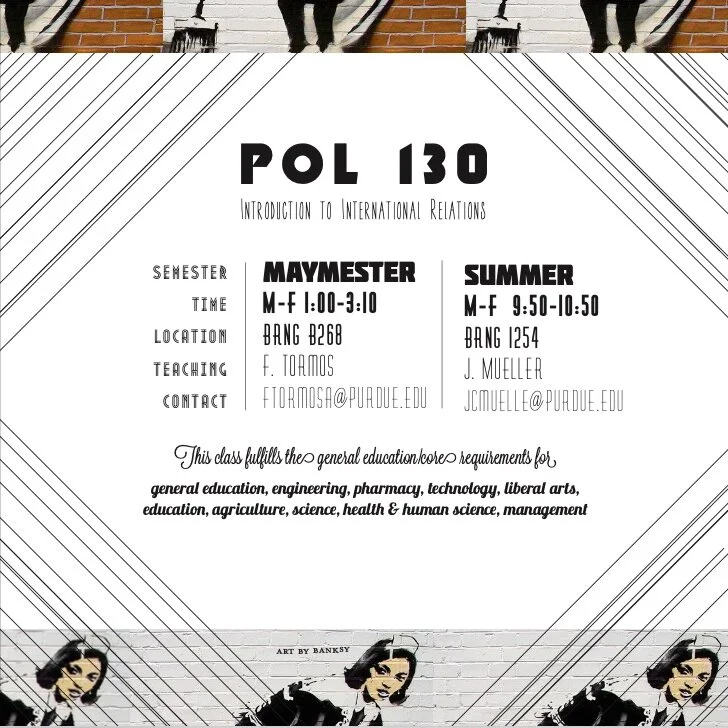
“Fernando is very well educated about public policy and shows great interest in the subject. His lectures are thorough and clear, and the class stayed well on schedule. He is very respectful of the different backgrounds from which his students came, and grades assignments and exams fairly and in good time.”
“I think class is a good mix of discussion and lecture. I liked how our papers were due in stages so that it kept us on track and allowed us to get feedback along the way.”
“Fernando is informed and ready for class. He clearly spends time preparing to lecture each day.”
“One of my favorite teachers at Purdue, different approach to learning, not too overwhelming, very satisfied in the course.”
“Fernando was so passionate about teaching. He was such a great instructor.”
“He does a very nice job of reviewing information and making sure students understand what is going on. He communicates with the students well and has their best interests at heart. He provides real world examples and challenges students to think critically.”
“Fernando was excellent at teaching key concepts in an unbiased way. He also got the class actively engaged in the material and showed a lot of enthusiasm for most topics in the class.”
“I liked the discussions over the material that we had in class. This helped me to understand the material really well.”
“The instructor is extremely passionate about his work and helps pass that enthusiasm to his students, therefore making the class more enjoyable. He is also very open to ideas when it comes to class discussions and this fosters a judgment free classroom.”
“He's very respectful to all groups of people and all walks of life. There isn't any personal bias that comes across in his teaching; he presents all alternatives to any argument in a neutral and respectful way.”
“Quick reviews from the previous day's topic help to highlight the key facts of the lesson; this is quite helpful in going back over notes taken. Also, the test review day is fantastic: it assists in clearing up ambiguity before the actual exam, which is great especially for the online exams where we have no direct person to ask.”
“The instructor always relates the concepts to real ongoing events which helps me understand the material better. For example, he uses documentaries and official websites like that of the United Nation's to help us understand the real application of concepts. The instructor is enthusiastic about teaching the material and can answer all our questions.”
TEACHING PHILOSOPHY
My main pedagogical aspiration is to prepare my students to think critically about political questions. To that end, I adopt two main teaching objectives: acquaint students with the theoretical landscape of our fields of study and prepare them to use theory to evaluate and interpret political phenomena. My teaching philosophy is based on principles of critical and intersectional pedagogies that incorporate matters of identity, knowledge construction, and power into the study of politics. My experience mentoring graduate and undergraduate students has given me the opportunity to help mentees fulfill their professional and academic aspirations, such as receiving research awards and fellowships to fund their graduate studies in research-intensive institutions. I welcome the opportunity to reach and work with new students.
Lecture Videos
SYLLABI (click for PDF)

Union of Concerned Scientists Science Advocacy Movement School
This science advocacy movement school seeks to adopt a decolonial, anti-patriarchal intersectional, and critical pedagogy. This movement school is decolonial because it values the knowledge that activists gain from their lived experiences and organizing. This school adopts an intersectional pedagogical approach because it centers the perspectives, knowledge, and voices of those harmed by the issues that we seek to address. Further, it is attentive to issues of power, domination, power differences, seeks to identify and use mechanisms of exerting power and subvert domination. This school adopts a critical pedagogy that seeks education as a means of liberation and repairing harm done against marginalized communities. It is critical because it evaluates sources of knowledge, the authors’ positionality, and the history and context of our sources. Further, this school questions claims to objectivity and seeks to acknowledge biases and standpoints of agents of knowledge. Lastly, this school is not neutral about social issues and seeks to promote learning that advances Justice.







